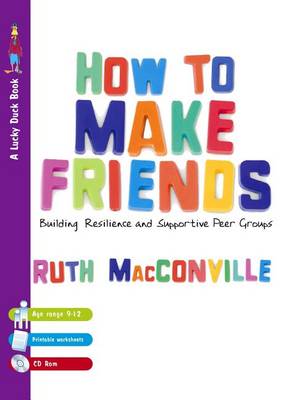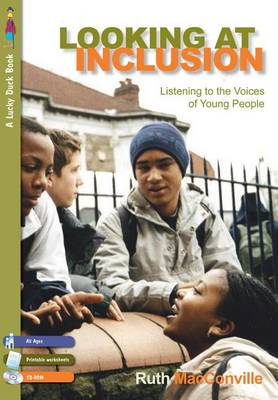Lucky Duck Books
3 total works
Pupils are rarely taught the principles of effective co-operation although being able to work effectively as part of a group is critical in all contexts; school, life and work.
The book is based on the author's practical experience of running the programme in schools and is underpinned by research into the development of pro-social behaviour and friendship skills.
The 26 sessions are arranged in the sequence of the alphabet from Attitude to the Zest for life. In each session there is a poster and a 'take away' activity as well as full facilitators' notes for whole class introduction, pair and share tasks and a plenary. A unique feature of the programme is that it addresses the development of non-verbal communication, the ability to read social cues.
The sessions raise awareness and understanding of the interpersonal skills necessary for friendships, including communication and co-operation.
The teaching sessions cover topics such as:
- Reciprocity
- Commitment
- Giving and sharing
- Trust
- Specific thinking skills.
The programme is intended for whole class work but would also be suitable for small groups.
Teaching Peer Support for Caring and Co-Operation
by Tina Rae and Ruth M Macconville
'In light of Every Child Matters agenda and of the current emphasis on giving children a voice in important decision making situations, this book could be a valuable tool'- Educational Psychology in Practice
'This is a great little book designed to help children between the ages nine and 12 to develop good relationships with each other and with other people... [It] includes clear guidance on ways in which children themselves can raise the self-esteem and social status of their less popular peers through listening, talking and understanding others' - SENCO Update
Ruth and Tina draw upon their experiences to provide a peer support programme that encourages inclusive prosocial processes for young people aged nine to twelve. Drawing upon the philosophy of a Circle of Friends, they have developed a six-step programme that harnesses the skills of popular young people to help others who may have low social status.
The Talk Time programme builds on the message that relationships are what matter most and emphasizes that relationships happen through listening, talking and understanding others.
The book provides all the resources needed including:
* facilitators' notes
* pupil resources
* letter to parents
* staff briefing sheet
* pupil certificate.
The programme is intended to be run for a group of eight to twelve pupils once a week during lunch times for one term. The aim is to help all group members and hopefully carry over to improve the social climate of the classroom and create a positive and cooperative working environment.
Ruth MacConville is the Head of the Special Educational Needs service, based in Ealing.
Tina Rae is a Senior Educational Psychologist based in Hillingdon.
`This is an excellent addition to the small but growing literature on pupil views....The book focuses on five areas of need (autistic spectrum disorder, visual impairment, specific learning difficulties, hearing impairment and physical disabilities) and examines the challenges of inclusion from the perspective of children and young people themselves. Their views come across powerfully, and perhaps most importantly, they offer clear and practical advice about how teachers and other staff can make schooling a less intimidating and excluding experience....This book is likely to be of particular interest to SENCOs and other colleagues who have interest in, and responsibility for developing pupil participation. It should also be required reading for trainee teachers and learning support staff' - SENCO Update
`This book is unique and readable. It has a great deal to offer all settings who are reflecting on the effectiveness of their pupil voice systems' - Special Needs Information Press
Developed from the work of specialist teachers in Ealing who have been involved in promoting inclusive practices, this book shows how eliciting the pupil's views and strengthening the pupil voice is an important element in the success of any inclusion project.
Covering a wide range of disabilities including Autistic Spectrum Disorders and Specific Learning Difficulties, it includes:
o Case-studies
o Descriptions of the difficulties encountered by the young
o Practical strategies to address these difficulties
o Useful resources.
Essential for any adult working in an inclusive setting, this fascinating book brings together theory with real practice.


